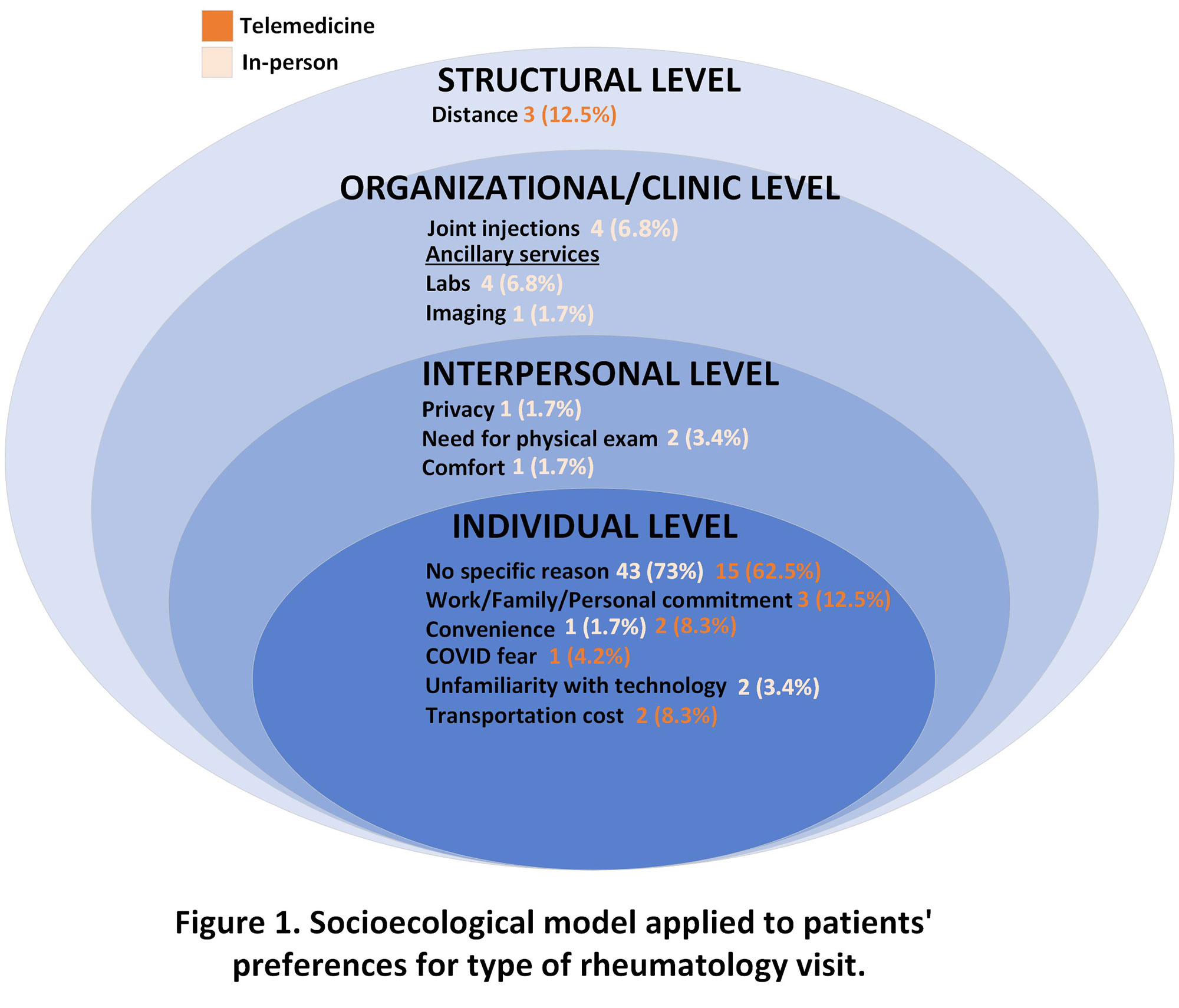Session Information
Session Type: Poster Session A
Session Time: 1:00PM-3:00PM
Background/Purpose: The COVID-19 pandemic has increased the use of telemedicine visits for patients living with rheumatic and musculoskeletal diseases (RMD). The factors that influence preferences of patients with RMD for telemedicine (vs). in-person visits are not well understood. The objective of this study, which is part of an ongoing multi-site clinical trial, was to examine factors influencing patients’ choices for the type of rheumatology visit.
Methods: During the recruitment process for a clinical trial comparing telemedicine vs. in-person rheumatology care (NCT04704544), we contacted patients with RMD by phone and asked them about their preference for their next visit type (telemedicine vs. in-person) and to specify their reasons for this preference. Patients’ answers to open-ended questions were analyzed thematically using the inductive method whereby two team members independently coded the data in excel with a third resolving any disagreements. Generated themes and sub-themes were contextualized into different levels of the socioecological framework. This project was approved by the UAB Institutional Review Board (IRB-300006553).
Results: We identified four levels of influence on patients’ preferences for the type of visit based on the socioecological framework: (i) individual influences; (ii) interpersonal influences; (iii) organizational/clinic level influences; (iv) structural influences (Figure). A total of 290 patients were contacted between March and May 2022 and 83 patients with mean age (SD) 56.8 (15.5) years, 22% men, 32.5% non-Hispanic Black expressed a preference for a visit type. Of these, 59 (71.1%) patients preferred an in-person visit. Of those who preferred an in-person visit, 43 (72.9%) did not give a specific reason. Reasons for preferring an in-person visit included: need for a physical examination, joint injections, or laboratory/imaging studies, privacy, personal convenience and comfort, as well as lack of familiarity with telemedicine (Figure 1). Of those who preferred a telemedicine visit (N=24), the majority (N=15, 62.5%) did not give a specific reason. Reasons for preferring a telemedicine visit included: COVID-19 fear, living/working too far from the clinic, cost of transportation, personal convenience, and prior commitments (Figure 1).
Conclusion: We found that almost a third of patients with RMD who received care at a large academic center in the Deep South were willing to have a telemedicine visit, although most desired an in-person visit due to organizational/clinic level influences which included need for ancillary services or procedures, convenience, and unfamiliarity with telemedicine. For those preferring telemedicine visits, we found that mostly individual-level influences, which included issues related to COVID fear, transportation cost, and convenience drove decisions. As this is an ongoing study, our next steps will include completion and analysis of the larger group of people who have specified their visit preference. Our findings suggest that continuing to offer telemedicine visits should be responsive to patients’ circumstances and needs.
To cite this abstract in AMA style:
Aaron K, Nasrallah C, Jackson L, Goglin S, Paez D, Chae D, Mugeta F, Techarukpong N, McNeeley E, Cutter G, saag k, Margaretten M, Danila M. Factors Influencing Visit Preference in Patients with Rheumatic Diseases: A Qualitative Study [abstract]. Arthritis Rheumatol. 2022; 74 (suppl 9). https://acrabstracts.org/abstract/factors-influencing-visit-preference-in-patients-with-rheumatic-diseases-a-qualitative-study/. Accessed .« Back to ACR Convergence 2022
ACR Meeting Abstracts - https://acrabstracts.org/abstract/factors-influencing-visit-preference-in-patients-with-rheumatic-diseases-a-qualitative-study/

